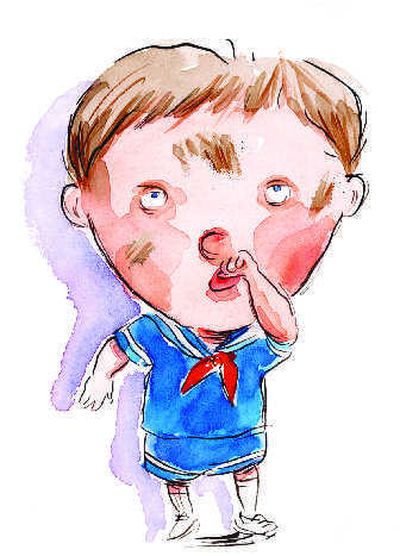Staying too clean may be a problem

CAMP HILL, Pa. – The supply closets at the Chesterbrook Academy Preschool can never be too crammed with paper towels, bottles of bleach and hand soap pumps.
The school’s children wash their hands before and after meals, after they go to the bathroom and when they return from a romp in the playground. After the children head home, tables and play areas are sanitized with bleach.
“We are constantly at the sinks,” Dreon Olivetti Niu, the center’s director, said of the children’s hand-washing regimen. “It’s pretty much what we do all day.”
But when Olivetti Niu heads home with her two children, ages 3 and 5, she’s not such a germ vigilante.
You won’t catch her chasing after them with antibacterial gel in hand or giving their toys a good scrub-down daily. She doesn’t panic when they let out a good sneeze.
“I think it can be dangerous to be too paranoid,” she said. “They need to build up their own antibodies.”
That’s just what Marc McMorris, a pediatric allergist at the University of Michigan, likes to hear from parents who are being bombarded with shelves of hand sanitizers and antibacterial products.
There is some wisdom in letting our kids be kids, he says, and some dirt on their hands isn’t so bad.
McMorris is a believer in what’s called the “hygiene hypothesis.” The theory, still being widely debated among experts, goes like this: While parents strive to kill disease-spreading germs with a plethora of sanitizers and cleaning products, today’s cleaner lifestyle may be contributing to a rise in allergies among children.
According to the American Academy of Allergy, Asthma and Immunology, the rate of allergies and asthma has been steadily increasing among children, with nearly 9 million being treated for the conditions.
“If we take away the immune system’s job, it’s going to look for something else to do,” McMorris said.
With less work to do, the immune system has shifted away from fighting off infections to developing more allergic tendencies, McMorris said. He and other hypothesis proponents certainly don’t suggest that parents forgo vaccinations and children’s baths, but they do advocate finding a healthy balance between being too clean or messy.
That’s not always easy, he admits, especially if parents suffer from allergies and asthma themselves.
“You walk the line between what makes common sense and not overprotecting your children,” said McMorris, who has four children of his own. “Let kids have fun, don’t put them in a bubble and keep them away from society. If they get a little dirty, soap and water will clean that off.”
Although research continues, a study used to support the theory showed that children who live on farms experience fewer allergies likely because they’re exposed to more endotoxins – substances in bacteria most commonly found in soil and household dust – than city children.
Another study found that children who were in day care before age 1 also experience less hay fever.
The controversial hypothesis has its skeptics, though, including Robert Zuckerman, an allergist and asthma specialist.
“A lot of it is hype,” he said.
He tells parents to use common sense, especially if they or their children have allergies: Don’t smoke around children, exercise as much as possible, keep dust mites at bay.
Most allergists, including McMorris, also suggest regularly cleaning furnace filters and keeping mold down in homes with allergy sufferers.
“It would not be a good idea to turn back time and go back to an age when we weren’t so clean,” he said, pointing to improved infant mortality rates with the advent of indoor plumbing and vaccines. “It’s not going to be helpful.”
Veronica Feight, a mother of two, wouldn’t go without antibacterial gels and her weekly dusting and vacuuming routine.
At the same time, though, her New Cumberland home doesn’t have to pass a white-glove test.
“I’m not a clean freak,” said Feight, who also baby-sits children at her home. “While I think cleaning is necessary, you don’t have to go overboard. I believe children make messes.”